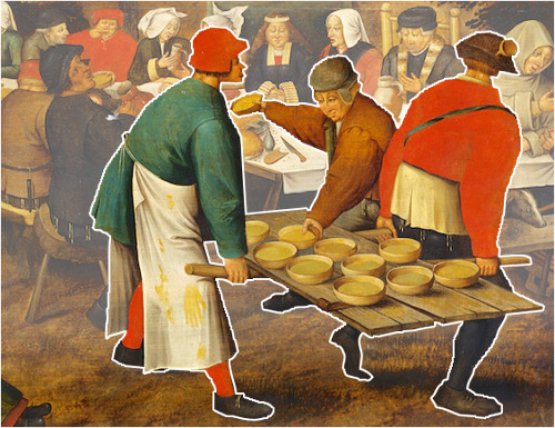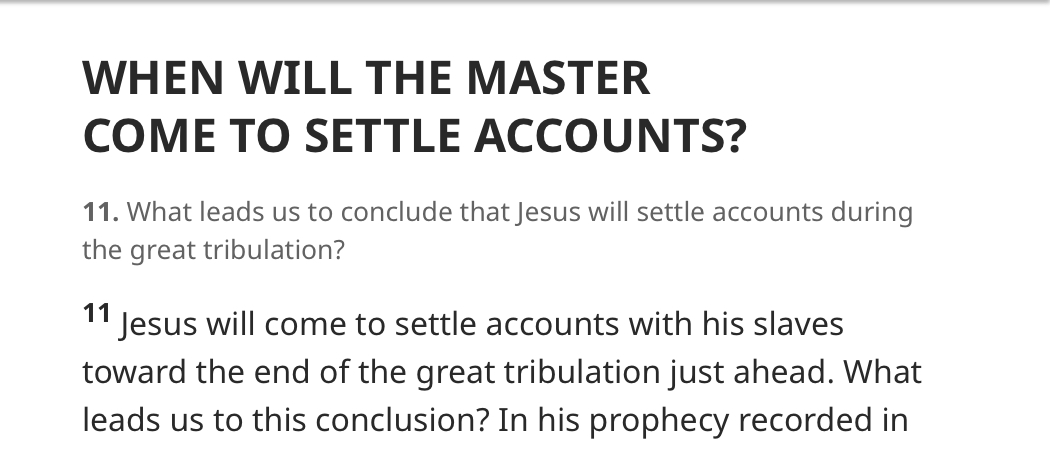Slave on probation
2021 / 2024



"Who really is the faithful and discreet slave whom his master appointed over his domestics, to give them their food at the proper time? Happy is that slave if his master on coming finds him doing so! Truly I say to you, he will appoint him over all his belongings."
(Matthew 24:45-47)
In his end-time prophecies in Matthew chapter 24, Jesus spoke of a ‘faithful and wise slave whom his master has put in charge of his servants to give them their food at the proper time.’
Who Is This "Slave"?
While many Christians largely agree that the characteristics of the end times described above are increasingly evident today, there are different interpretations of the ‘faithful and discreet slave.’ Within the Jehovah's Witnesses religious community alone, the ‘slave’ was understood to mean ...
-
First, an individual, namely the founder and president of the Watchtower Society, Charles T. Russell.
-
Then, all spirit-anointed Christians with heavenly hope currently living on earth.
-
Then the portion of the spirit-anointed with heavenly hope who are engaged in publishing Bible-explaining literature,
-
and for several years now, the Governing Body, a group of currently eight spirit-anointed men with heavenly hope.
What Are The Duties Of The ‘Slave’?
Because Jesus announced with this ‘slave’ someone who is not only supposed to keep us mentally and spiritually strong, but also to bring us joy – just as you not only eat and digest food, but also enjoy it.
That is the task of the slave, and that should be the effect of his activity on all of us.
For two reasons, it is crucial to recognise what this ‘slave’ is and what he is not:
- You will find out which sources are safe to drink from and under what conditions.
- It will also help you, even in extremely hostile circumstances (e.g. persecution from outside or inside), not to ‘throw the baby out with the bathwater’, so to speak, and lose your faith in God, but to remain steadfast in your faith and even be able to say: I expected this. The Bible prepared me for it.
Silent change of perspective
With regard to the “faithful and discreet slave,” a very quiet paradigm shift took place among Jehovah's Witnesses in 2015.
In the Watchtower study edition of March 15, 2015, the following is stated on page 22 under the subheading “When Will the Master Come to Settle Accounts?”:
“Jesus will come to settle accounts with his slaves toward the end of the great tribulation just ahead.”
What does this inconspicuous sentence actually mean?
- Jesus (the “master of the house” from the parable) has not yet “returned.”
For if he returns only “toward the end of the tribulation” and the tribulation still lies ahead of us, logically he cannot have returned yet. - If he has not yet returned, Jesus has not yet settled accounts with his “slave.”
In other words, since we are not yet in the great tribulation, the previous teaching of Jehovah's Witnesses proves to be a false claim in the “new light” of this study article. In 1919, Jesus did NOT reward the group that call themselves the “faithful and discreet slave” and he did. NOT put them over all his possessions. This did not happen in 1919, nor has it happened to this day, because the tribulation is still ahead of us.
Thinking logically, this has far-reaching consequences...
First: Incorrect designation
Since Jesus is the one who will settle accounts with the slave and evaluate his work, and since this evaluation is still in the future, no one has the right to designate himself in advance as a “faithful and discreet slave.” That would mean anticipating Jesus' judgment and sitting on his judgment seat, which would be very disrespectful to him, but also to the one who has given him this supreme authority and power of judgment: Jehovah God.
No, from Jesus' point of view, the “slave” who began distributing spiritual food at the end of the 19th century is still in the phase in which he must prove himself through his work, his inner attitude, and his loving approach; he is
"Slave On Probation".
Second: Incorrect job description
Since Jesus has not yet settled accounts with the “slave on probation,” he has not yet placed him in charge of all his possessions. The ‘slave’ is therefore not authorized to rule over everything: people, material, dogmas, jurisdiction—he has appropriated these areas of activity for himself, contrary to his master's instructions, and thus “beats” and mistreats his fellow slaves.
This, in turn, explains why there is so much destructive proliferation and abuse of power within the WT organization. Under President Rutherford, the Watch Tower Bible and Tract Society began to develop into the tightly centralized religious enterprise we see today.
The slave's job is to serve good food—not to check whether everyone chews each bite 23 times, whether the cutlery is placed at right angles on the tablecloth, or whether everyone has regular bowel movements every day. Just prepare and serve, with love, spirit, and truth.
The slave is not a judge, ruler, or executioner, but simply, according to the job description, a
"Cook And Waiter".
Can the “slave on probation” expect only recognition and praise from Jesus?
Oh no. Jesus told four parables to illustrate the good behavior, but also the misconduct, of this particular group from different angles:
- the parable of the talents (Matthew 25)
- the parable of the minas (Luke 19 / Matthew 28)
- the parable of the virgins (Matthew 25)
- the parable of the ten minas (Luke 19 / Matthew 28)
Wouldn't this effort have been unnecessary if the individual members of this group were incapable of acting wrongly? Apart from the fact that this would stand in the way of clarifying universal disputes and would also violate Jehovah's concept of free will...
No, Jesus emphatically warned his appointed servants of the real possibility of failure: Those who betray their master's trust and abuse his authority will not only be barred from participating in the “wedding feast of the bridegroom,” but will even be cast out, weeping and gnashing their teeth, which indicates eternal destruction!
The evil-minded slave will be smashed to pieces!
Is the matter really that serious? Let's take a closer look at the Bible text about the “faithful and discreet slave.” The second part of the parable is quoted less often. It reads:



"But if ever that evil slave says in his heart, ‘My master is delaying,’ and he starts to beat his fellow slaves and to eat and drink with the confirmed drunkards, the master of that slave will come on a day that he does not expect and in an hour that he does not know, and he will punish him with the greatest severity and will assign him his place with the hypocrites. There is where his weeping and the gnashing of his teeth will be."
(Matthew 24:48-51)
So what would be the consequence if this collective “servant” exceeded his authority, mistreated his fellow servants, and drank? Then his master would “punish him with the utmost severity” upon his unexpected return (Matthew 24:51, NWT).
Interestingly, other translations express the punishment of the wicked servant in much more drastic terms:
The original text contains the Greek word “dichotomesei,” a verb form. The Greek word διχοτομέω means “to cut in half, to split into two parts.” Dichotomy literally means “division into two parts” and refers to a structure consisting of two parts that oppose each other, or a division into two contrasting parts.
The choice of words suggests what Jesus will do at his second coming, namely:
-
In a collective sense:
to smash the “evil slave” as a functioning organ, to render it inoperable; -
In a spiritual sense:
to divide the slave, consisting of individuals, into two groups with opposing inner attitudes: one group acts lovingly, the other does not (work of separation = spiritual dichotomy); -
In an individual sense:
cut up, punish, or even eradicate every disloyal, presumptuous member of the “slave.”
Trick question: “Do you accept the faithful and discreet slave?”
Conscientious answer: "I firmly believe that Jesus is closely watching how his followers handle their responsibilities and that he will settle accounts—both with those who fit the description of the faithful slave and with those who act like the evil-minded slave. But as the Governing Body itself says, Jesus has not yet settled accounts, and therefore I do not want to prejudge Jesus' judgment. Look at their fruits!"









